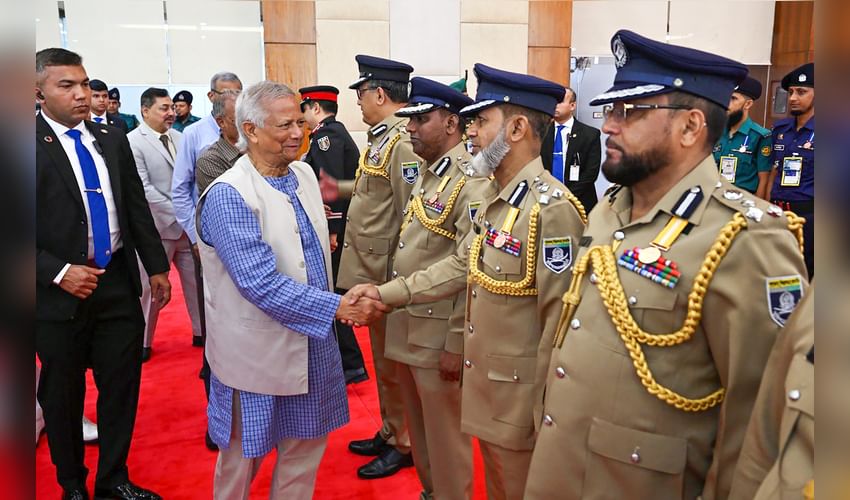World
Extremists trying to mould Bangladesh army into Islamic military order: Report
Published On Fri, 21 Nov 2025
Asian Horizan Network
1 Views

Dhaka, Nov 21 (AHN) Islamic fundamentalists are trying to mould Bangladesh's army into an Islamic military order as the interim government led by Chief Advisor Muhammad Yunus is preparing to send to jail 15 serving army officers for alleged serious crimes under the previous regime of Sheikh Hasina, a report has stated.
The officers have been placed in military custody. However, the International Crimes Tribunal (ICT) which has prosecuted these officers has demanded that they be shifted to civilian custody. After the hearing in October, the officers have been kept in a sub-jail established in Dhaka Cantonment under the supervision of the prison authorities, according to a report in the Asian News Post. The prosecution has formally charged 28 people, including Bangladesh's former Prime Minister Sheikh Hasina and 23 top and mid-ranking current and former army officers and the reason behind these charges is two long-pending cases of enforced disappearance and torture.
"At a time when the Jamaat-e-Islami, aided by the Inter Service Intelligence of Pakistan, is quietly spreading its influence among a section of the Bangladesh military, this step will undermine the morale of the officers and men in the army. In future the Bangladesh army may, like the Pakistan army, turn into an Islamic radical force," the report stated.
Analysts have said that this prosecution is a calculated move to demoralise a professional army which during the uprising in Bangladesh last year played a significant role in stabilising the situation. According to analysts, the move to implicate senior officers of the rank of Major General and Brigadier Generals in two cases is due to a conspiracy planned by fundamentalist groups to undermine the Bangladesh Army as a professional force, so that the army does not stand in the way of spreading fundamentalist Islam in Bangladesh.
The Bangladesh army also had a disagreement with Yunus over the issue of Rakhine corridor. Bangladesh Army Chief General Waker-Uz-Zaman objected to Yunus' decision to discuss opening of such a corridor with the United Nations without consulting the army. Bangladesh Army Chief stated that interim government should not make such policy decisions and wanted the election to be held in 2025 itself. This was unacceptable to Jamaat-e-Islami and other fundamentalist Islamic groups which do not want the elections to be held till they have consolidated their position to contest the elections.
"Islamists view the secular Bangladesh army, rooted in the values of the Liberation War of 1971, an obstacle in the way of the spread of Islamist values in the country. They want to undermine the traditional secular democratic values of Bangladesh to help spread the hardcore Islamic agenda. When the Jamaat-e-Islami had a presence in the Bangladesh government as a partner of the ruling Bangladesh Nationalist Party, it had used the opportunity to get its cadres recruited in the armed forces. They functioned in a discreet manner and were lying low when the Sheikh Hasina government was in power; biding their time and awaiting a political transformation in the country," the Asian News Post report highlighted.
It recalled that the mutiny in the para-military Bangladesh Rifles in 2009 was suspected to have been influenced by the Jamaat whose leader Abdur Razzak was questioned for three hours by the CID of Bangladesh after the failed coup attempt. Now, under the regime of the interim government, taking advantage of the political vacuum, Islamic fundamentalists are trying to mould the Bangladesh army into an Islamic military order; following the model of the Pakistan army.
"In Pakistan, the relationship between the army and Islamic radicalism has been a symbiotic one. While the army has been infiltrated by radical Islamic elements, it has utilized radical Islamic outfits to achieve strategic goals. The army has leveraged Islamist terror outfits like Lashkar-e-Toiba and Jaish-e-Mohammed to wage a proxy war against India in Kashmir. The infiltration of radical Islam in the Bangladesh army will undermine the democratic institutions in the country and disturb the delicate balance of civil and military power. This will finally destroy the political stability of the country and be suicidal for Bangladesh. Besides, with the army looking the other way, Islamic forces will be encouraged to attack minority communities like the Hindus, the Buddhists and the Christians. In Pakistan, where radical Islam has a much stronger presence, the minority population has been reduced to only about three percent of the total; while in Bangladesh minorities constitute about nine percent of the total population," it added.



